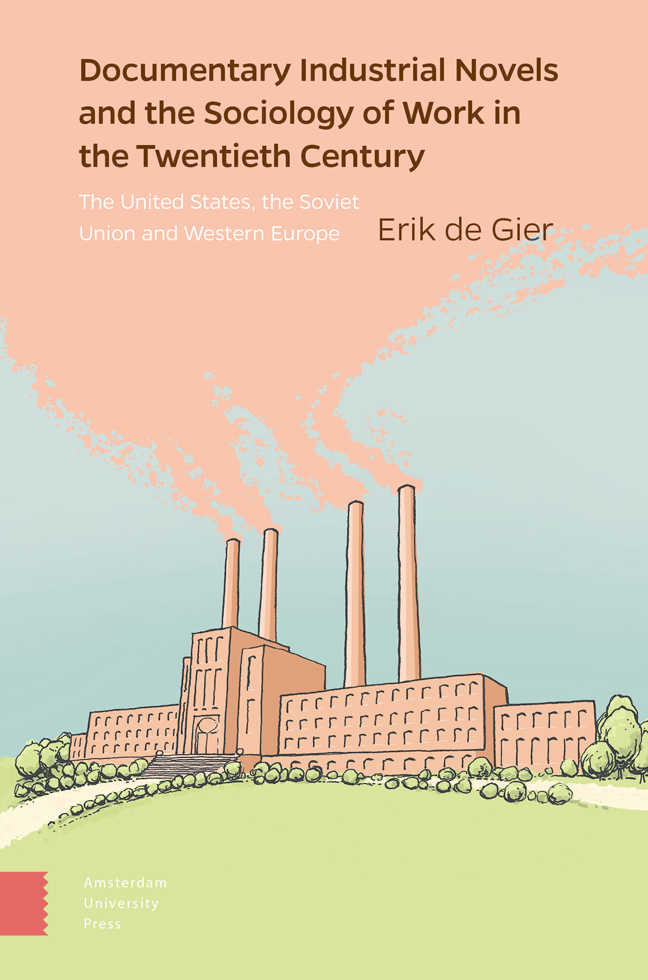 Documentary Industrial Novels and the Sociology of Work in the Twentieth Century
Documentary Industrial Novels and the Sociology of Work in the Twentieth Century Book contents
- Frontmatter
- Contents
- Acknowledgements
- Preface
- Note on sources
- 1 Bringing together the fields of sociology and literature: Towards an integration of Modernist industrial novels into industrial sociology
- 2 The rise of welfare work capitalism and the Americanization of production processes in the United States, Western Europe, and the Soviet Union
- 3 Between ‘utopia’ and ‘dystopia’: American 20th-century industrial novels
- 4 Socialist-realist industrial novels in the Leninist and Stalinist Soviet Union in the 1920s and 1930s
- 5 New Objectivity industrial novels in Weimar Germany
- 6 Neo-realist industrial novels in post-war Italy: The Olivetti case
- 7 Simone Weil and Modernist industrial novels in France
- 8 Transnational comparison and concluding reflection
- Bibliography
- Index
3 - Between ‘utopia’ and ‘dystopia’: American 20th-century industrial novels
Published online by Cambridge University Press: 20 February 2024
- Frontmatter
- Contents
- Acknowledgements
- Preface
- Note on sources
- 1 Bringing together the fields of sociology and literature: Towards an integration of Modernist industrial novels into industrial sociology
- 2 The rise of welfare work capitalism and the Americanization of production processes in the United States, Western Europe, and the Soviet Union
- 3 Between ‘utopia’ and ‘dystopia’: American 20th-century industrial novels
- 4 Socialist-realist industrial novels in the Leninist and Stalinist Soviet Union in the 1920s and 1930s
- 5 New Objectivity industrial novels in Weimar Germany
- 6 Neo-realist industrial novels in post-war Italy: The Olivetti case
- 7 Simone Weil and Modernist industrial novels in France
- 8 Transnational comparison and concluding reflection
- Bibliography
- Index
Summary
Abstract
This chapter deals with American Modernist industrial novels dating from the turn of the 19th century until World War II. It focuses on novels by Upton Sinclair and John dos Passos. Sinclair, an exponent of the ‘Progressive Era’, believed strongly in the ‘American Dream’, encompassing a substantial improvement of working and living conditions for the working class. This was different from Dos Passos. His trilogy U.S.A. was set against the background of the Wall Street crash of 1929 and the New Deal in the 1930s. U.S.A. no longer expressed the strong middle-class reform ideal of the ‘American Dream’. Sinclair's style is documentary, while Dos Passos introduced an innovative experimental style. The sociology of work could benefit from studying both.
Keywords: American industrial novels, American Dream, New Deal, working conditions, Taylorism, Fordism.
Introduction
This chapter deals with a selection of exemplary modernist American industrial novels published in the first decades of the 20th century. These are Upton Sinclair's novels about working and living conditions in Chicago's meatpacking houses (1906), American coal mining (1917), and Henry Ford and his motor company (1937) as well as a major industrial novel, U.S.A. (1938), written in the middle of the Great Depression by John Dos Passos. They were not the only writers of industrial novels in the United States in this period, but in my opinion they are by far the most important and influential, and are representative of the broader context of American industrial relations as they developed over the decades. Also, at the time of the Great Depression a substantial stream of so-called ‘proletarian’ literature evolved. One remarkable exponent of this stream of literature is Jack Conroy's The Disinherited (1931/1991), about working conditions in a Missouri coal mine. Conroy was a young working-class author who pictured his life as a boy in a coal-mining town (Denning, 1997/2010, pp. 200–229; Basset, 2014). According to Denning, proletarian literature was not simply literature by workers, on behalf of workers, or about workers. It was more like a literary formation or movement marked by an alliance of writers, editors, agents, publishers, reviewers, political activists and readers. They met each other in formal and informal clubs, magazines, contests, conferences, schools, public lectures, political rallies, May Day parades, and picket lines. Well-known assembling points at the time were so-called local John Reed Clubs, which spread across the country.
- Type
- Chapter
- Information
- Documentary Industrial Novels and the Sociology of Work in the Twentieth CenturyThe United States, the Soviet Union and Western Europe, pp. 37 - 58Publisher: Amsterdam University PressPrint publication year: 2023


